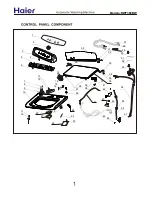
20
Operations
Detergents & General
Operating Techniques
WARNING: Some detergents may
be harmful if inhaled or ingested,
causing severe nausea, fainting
or poisoning. The harmful
elements may cause property
damage or severe injury.
STEP 1:
Connect high pressure
hose to injector with quick coupler
(check to make sure locking coupler
sleeves are in proper position before
applying water pressure. If using detergent injector,
connect it to discharge nipple on machine.
STEP 2:
Use detergent designed
specifically for pressure washers.
Household detergents could
damage the pump. Prepare
detergent solution as required by the
manufacturer. Fill a container with
pressure washer detergent. Place
the filter end of detergent suction
tube into the detergent container.
STEP 3:
Apply safety latch to spray gun trigger. Turn
variable pressure control handle until discharge water
exits both tubes. Secure black detergent nozzle into
quick coupler if you have a single wand.
NOTE:
Detergent cannot be applied using Red, Yellow, Green
or White nozzles.
STEP 4:
With the engine
running, pull trigger to operate
machine. Liquid detergent is
drawn into the machine and
mixed with water. Apply
detergent to work area. Do not
allow detergent to dry on surface.
Thermal Pump Protection
If you run the engine on your pressure washer for 3-5
minutes without pressing the trigger on the spray gun,
circulating water in the pump can reach high tempera-
tures. When the water reaches this temperature, the
pump protector engages and cools the pump by
discharging the warm water onto the ground. This
thermal device prevents internal damage to the pump.
Cleaning Tips
Pre-rinse cleaning surface with fresh water. Place
detergent suction tube directly into cleaning solution
and apply to surface at low pressure (for best results,
limit your work area to sections approximately 6 feet
square and always apply detergent from bottom to top).
Allow detergent to remain on surface 1-3 minutes. Do
not allow detergent to dry on surface. If surface
appears to be drying, simply wet down surface with
fresh water. If needed, use brush to remove stubborn
dirt. Rinse at high pressure from top to bottom in an
even sweeping motion keeping the spray nozzle
approximately 1 foot from cleaning surface. Use over-
lapping strokes as you clean and rinse any surface. For
best surface cleaning action spray at a slight angle.
Recommendations:
•
Before cleaning any surface, an inconspicuous
area should be cleaned to test spray pattern
and distance for maximum cleaning results.
•
If painted surfaces are peeling or chipping, use
extreme caution as pressure washer may
remove the loose paint from the surface.
•
Keep the spray nozzle a safe distance from the
surface you plan to clean. High pressure wash
a small area, then check the surface for
damage. If no damage is found, continue to
pressure washing.
CAUTION - Never use
•
Bleach, chlorine and other corrosive chemicals
•
Liquids containing solvents (i.e., paint thinner,
gasoline, oils)
•
Tri-sodium phosphate products
•
Ammonia products
•
Acid-based products
These chemicals will harm the machine and will
damage the surface being cleaned.
Rinsing
It will take a few seconds for the detergent to clear.
Apply safety latch to spray gun. Remove black soap
nozzle from the quick coupler. Select and install the
desired high pressure nozzle. NOTE: You can also stop
detergent from flowing by simply removing detergent
siphon tube from bottle.
Karcher HDS 3.5/40 GE MT Operator’s Manual 9.807-942.0 - B
WARNING
High
Pressure
Hose
Detergent
Injector
(Option)













































